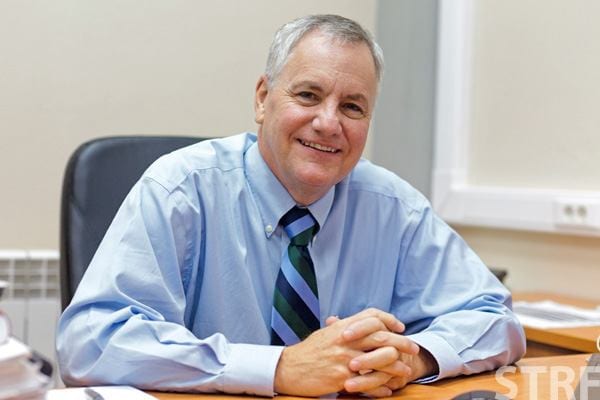Endpoint Security Gets Recognized for Encryption-free Cybersecurity Solution

Page Heller, CEO of Endpoint Security (photo courtesy of Endpoint)
Endpoint Security is a Texas-based secure communications startup developing a product that authenticates fixed wireless devices in industrial, commercial and home environments. It uses a device’s natural Radio Frequency (RF) signal as a fingerprint, uniquely identifying and authenticating each device and preventing unauthorized communications through the same access point. Endpoint Security Chief Executive Officer (CEO) Page Heller took his product to the OilComm/FleetComm 2018 show in Houston and competed in the event’s Startup Space entrepreneur pitch competition, where he and his company were named grand prize winners. Following his victory, Heller and Endpoint Security Chief Technology Officer (CTO) Jay Labhart spoke with Via Satellite about the launch of the company and the idea to develop a cybersecurity product that doesn’t use encryption or keys to protect networks.
Via Satellite: What made you want to get into the business of producing secure router and network hardware with a cybersecurity focus?
Heller: I’ve been managing inventions that result from university research for twenty years. I’ve assessed something like two thousand inventions. Still, when I saw this one at the University of Notre Dame, I was like “wow!” My background in industrial control systems made this leap out at me. Finally, a magnificent way to protect wireless devices from man-in-the-middle attacks! I was ecstatic! I had to license it and make a go of it.
Labhart: I got interested because I immediately saw that leveraging a unique patent portfolio and technical know-how makes Endpoint technology a viable solution for wireless operations.
Via Satellite: What makes your technology and approach to preventive network defenses unique among other vendors?
Heller: The ability of Endpoint Security’s technology to recognize devices solely by their RF signal is huge. By working on the physical layer of the Open Systems Interconnection (OSI) model for communications, we are able to authenticate devices without regard to the standards or protocols they use. Finally, we are out in front of the attacker. We prevent their access to the network instead of waiting for an attack to be underway and trying to recognize it. It is a fundamental change in how we secure communications.
Labhart: The ability to work in RF avoids many of the pitfalls of signature-based processing in packet inspection technology. Unlike existing products, this sensing capability operates independently and allows for continuous monitoring of wireless operations. We simply eliminate spoofing threats.
Via Satellite: You have an impressive network of tech partners (Cisco, Honeywell, Emerson, Yokogawa, etc.) How does this benefit both your product development and expanding customer network?
Heller: Those will hopefully be our customers. We’ll develop a chip set that we sell to router and gateway manufacturers. That way, to protect all your wireless devices, you would only need to buy a router with “endpoint technology inside.” It’s as easy as that, since we don’t require any modification to the wireless endpoint device at all.
Via Satellite: How has the oil and gas market responded to your product line?
Heller: Mixed, quite frankly. Those who immediately understand the technology behind the innovation usually embrace the concept with great enthusiasm. I have had two offers from engineers to quit their jobs and join Endpoint Security. But, there are a number who haven’t recognized that they have a problem. They often say “I’m not worried about my old legacy devices; no one wants temperature data anyway.” But, of course, that’s not why they will get attacked. The hacker will come in through a temperature sensor to gain access to the network. Once in, they can cause all kinds of damage; even loss of life.
Via Satellite: How do feel about winning the Startup Space competition at OilComm?
Heller: I had just completed a pitch to the MIT Enterprise Forum Mentor Clinic, at Houston Exponential. They have a panel of judges tell you how to improve your pitch. It certainly paid off, as I took a lot of their suggestions and incorporated them into the pitch I made to OilComm. It’s funny. I mentor young entrepreneurs in making pitches in many competitions, but even a mentor needs to be mentored. The OilComm competition is so professionally run it was a delight to participate. Those who competed with me are also winners. They were all excellent and are very likely to benefit from the exposure as much as I have.
Via Satellite: What is the next big milestone that you’re working toward? What are your most important long-term goals?
Heller: I will present an Institute of Electrical and Electronics Engineers (IEEE) technical paper on our technology in mid-November in Vancouver at the Future Technologies Conference. It will be only the second; we won best paper at a conference in Denver in August. Then, our sights will be focused on obtaining seed round investment in 2019. It shouldn’t be too hard. I’ve already had venture capital firms calling me. When does that ever happen?
Labhart: We believe we can be on the market within two years. Growth should be fast. Endpoint Security technology fills a hole that has no other good solution. Watch for us in your next router purchases.
New business entrepreneurs interested in competing at Startup Space at SATELLITE 2019 can fill out an application here. Applications will be accepted through Dec. 31, 2018.